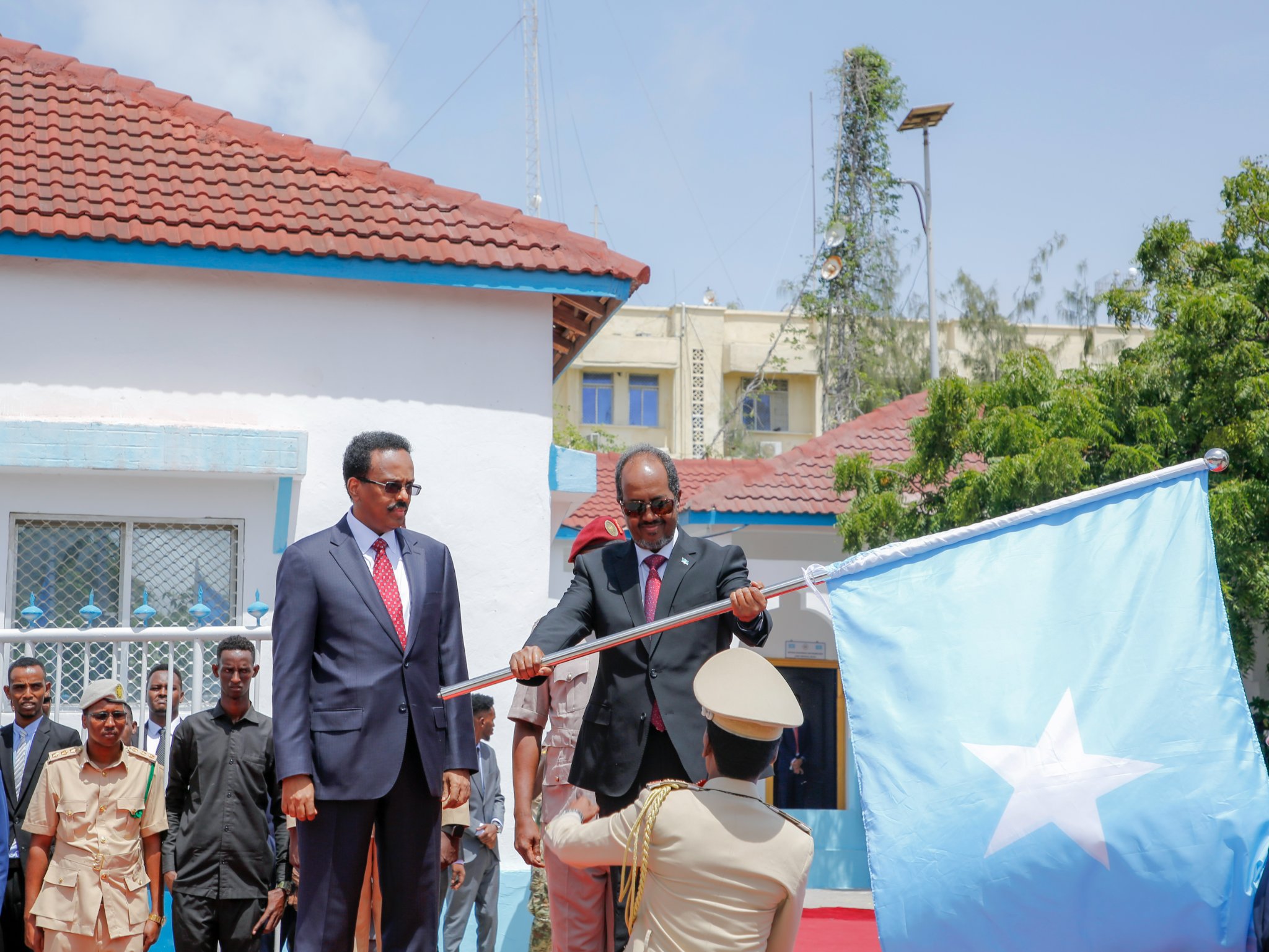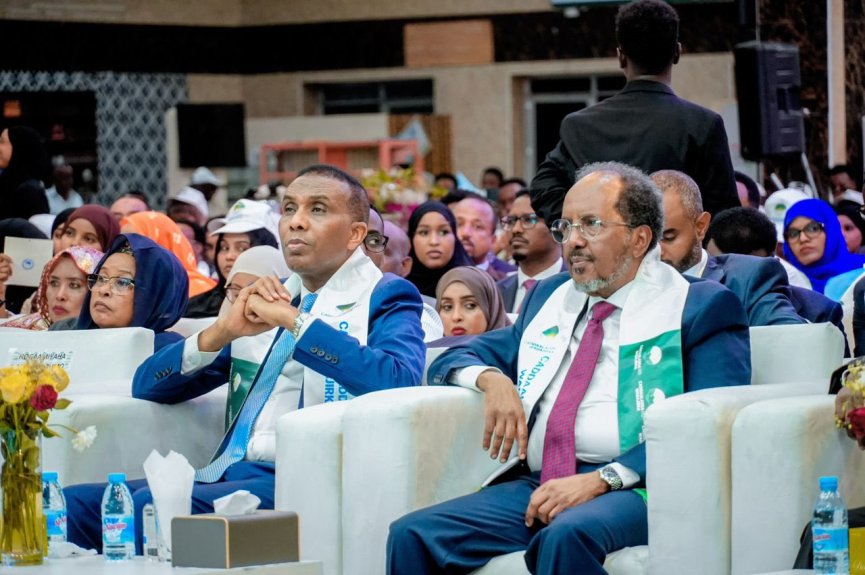
OP-ED: Three Years On – How Hassan Sheikh Betrayed Somalia's Fragile Federalism
|
15 May 2025 20:16

MOGADISHU – Three years ago, on May 15, 2022, Somalia's political landscape appeared poised for a reset. The return of Hassan Sheikh Mohamud to Villa Somalia was met with cautious optimism—an elder statesman reclaiming the reins of power in a nation desperate for unity and recovery.

His rallying cry, "Somalia at peace with itself and abroad,” promised a decisive break from years of transitional dysfunction and regional isolation.
Today, as his administration crosses the halfway point, that promise lies heavily burdened by deep internal fractures, diplomatic blunders, massive corruption that brought the country to its knees and an insurgency that remains both relentless and adaptive.
The very pillars upon which Hassan Sheikh anchored his second presidency—reconciliation, constitutional clarity, international alignment, and security—are now in crisis.
An Electoral Minefield and the Constitution in Limbo
One of the clearest indictments of the current administration is the persistent deadlock over Somalia’s electoral framework. Far from achieving a unified model, the country has become more fragmented.
Tensions between the federal government and Federal Member States (FMS), especially Puntland and Jubaland, have intensified, eroding trust and threatening the fragile balance of federalism.
The federal government’s push for a controversial one-person, one-vote system without first seeking consensus has raised alarm bells, not because of the principle itself, but due to its unilateral rollout.
Opposition groups argue that it lacks legal clarity, institutional readiness, and most crucially—political inclusivity.
Meanwhile, the constitutional review process—once expected to anchor long-term stability—has stalled. Draft amendments presented in Mogadishu have sparked suspicion among the federal member states, with many viewing them as attempts to centralize power under the guise of reform. Instead of healing Somalia’s political wounds, the process has opened new ones.
Against all odds, the President has pressured three federal member state leaders—Galmudug, Hirshabelle, and Southwest—to join his unilateral political party – Justice and Solidarity Party. This party officials also include the Prime Minister, Deputy Prime Minister, Deputy Speaker, and nearly all government ministers, signaling a shift toward authoritarian rule reminiscent of regimes in Djibouti and Turkey.
The once diverse National Consultative Council (NCC) is now effectively defunct, its remnants absorbed into a single-party structure.

PHOTO: The President pressured FMS leaders to join his unilateral Justice and Solidarity Party, which includes top officials such as Prime Minister Hamza Abdi Barre.
Foreign Policy Flip-Flops and Lost Leverage
Under President Hassan Sheikh’s watch, Somalia’s foreign relations have swerved unpredictably, damaging trust with key allies.
The fallout with Ethiopia over its controversial Red Sea agreement with Somaliland plunged Horn diplomacy into crisis. The agreement—widely seen as a threat to Somalia’s territorial integrity—forced the government to seek urgent regional support.
But Mogadishu’s initial diplomatic missteps and emotive responses left observers questioning its strategic depth.
Elsewhere, relations with the United Arab Emirates have been strained over security cooperation and political influence. Even traditional allies like the United States, who re-established military presence in Somalia, have reportedly grown concerned about inconsistencies in Mogadishu’s foreign policy orientation.
The administration’s habit of issuing sweeping nationalist declarations without policy depth has undercut Somalia’s image as a stable partner on the international stage.
Security Gains Overshadowed by Strategic Gaps
The government declared "total war” on Al-Shabaab in 2022, and early gains—especially in central Somalia with the help of clan militia groups—were celebrated. Local communities were mobilized, and Somali National Army (SNA) offensives backed by clan militias achieved symbolic victories.
However, the momentum proved difficult to sustain. Retaken territories often lacked follow-up governance or services, allowing Al-Shabaab to regroup. In some areas, the insurgents have returned stronger, emboldened by local resentment toward federal neglect.
Today, the militant group controls most parts of Middle Shabelle, Hiiraan, and Lower Shabelle as it advances toward Mogadishu.
The slow and uncertain transition from ATMIS to the Somali-led AUSSOM mission raises growing concerns. With donor fatigue setting in and Somali forces overstretched, questions about the long-term sustainability of security remain unanswered, and the African Union mission stands on the brink of collapse.
A Presidency at Odds With Its Own Slogan
President Hassan’s supporters insist progress is underway—pointing to debt relief milestones, returning diaspora investment, and symbolic state-building moves like the Mogadishu Development Corporation.
Yet these isolated wins cannot mask the broader sense of disillusionment. Political legitimacy is waning, and accusations of exclusionary governance are growing louder.
Far from being at peace with itself and the world, Somalia under Hassan Sheikh has become more polarized at home and more unpredictable abroad. The credibility gap between government rhetoric and lived reality is widening, feeding public cynicism and energizing opposition.
With just under two years left in office, President Hassan Sheikh Mohamud faces a defining choice: continue down the current path of selective engagement and top-down governance—or recalibrate toward true national consensus.
That would mean reopening electoral talks with all stakeholders, including opposition figures and skeptical federal member states. It requires transparency in foreign affairs, measured rhetoric, and investment in post-liberation governance—not just military bravado.
Hassan Sheikh’s second term was meant to restore diplomacy and inclusive governance. Instead, it has exposed the fragility of Somalia’s progress. This requires the humility to accept that slogans are no substitute for real leadership.
If he really wants to salvage his legacy and fulfill his promise of peace, the time to change course is now. The clock is ticking—and history won’t be kind to those who chose rhetoric over results.
——
The Author is the Director of Arlaadi Media Network, Foreign Policy journalist and communications specialist. You can reach out him in X (Twitter) @JaylaaniJr
Leave a comment
- Popular
- Rated
- Commented
04/11/2021 - 11:05:02
28/05/2024 - 15:44:10
02/12/2021 - 11:34:53
01/03/2021 - 09:00:37
Opinions
18/05/2025 - 16:26:37
15/05/2025 - 20:16:04
Politics
05/06/2025 - 13:42:50
17/04/2025 - 01:58:17
Terror Watch
Press Releases
05/06/2025 - 12:21:21
02/06/2025 - 21:29:33
 0
0 




































OP-ED: Three Years On – How Hassan Sheikh Betrayed Somalia's Fragile Federalism
MOGADISHU – Three years ago, on May 15, 2022, Somalia's political landscape appeared poised for a reset. The return of Hassan Sheikh Mohamud to Villa Somalia was met with cautious optimism—an elder statesman reclaiming the reins of